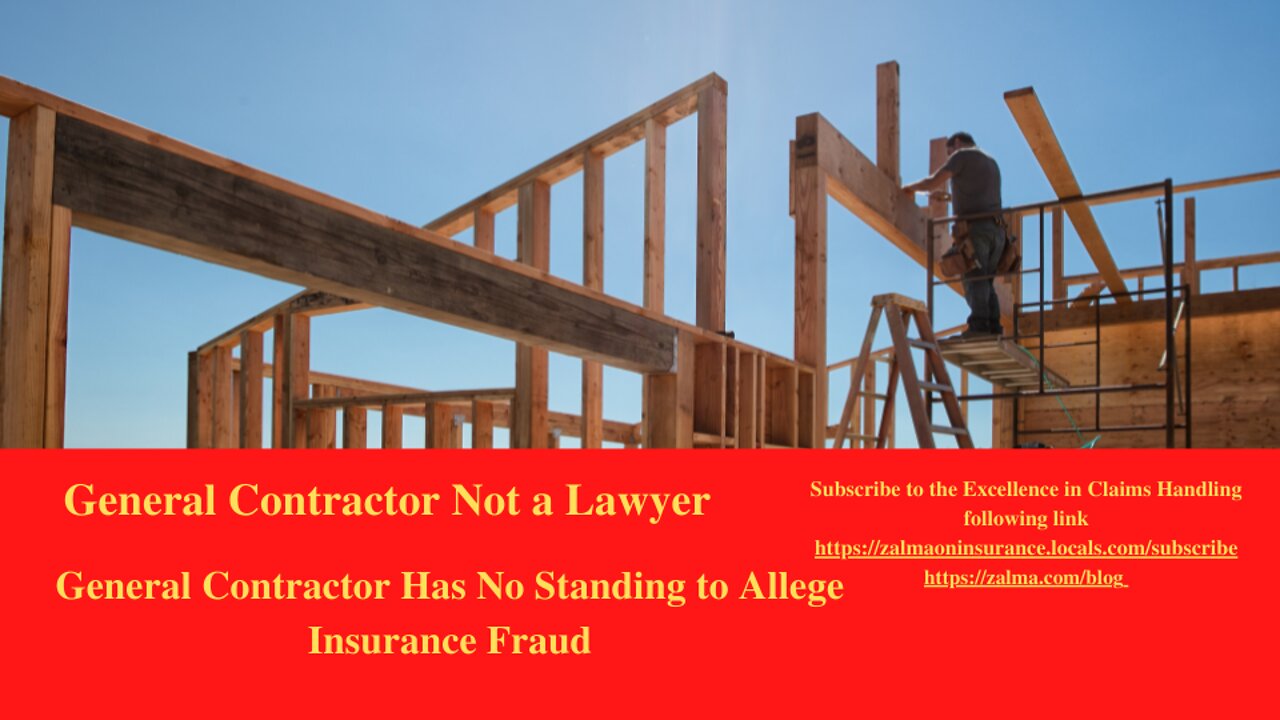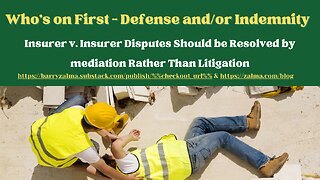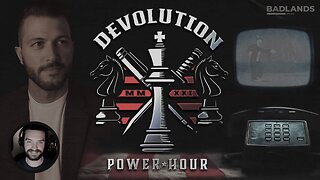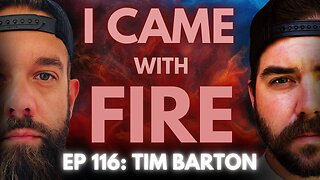Premium Only Content

General Contractor Not a Lawyer
General Contractor Has No Standing to Allege Insurance Fraud
Steven Hester Hall appealed from an order granting Defendants' motion to dismiss Hall's claims for breach of fiduciary duties, insurance licensing violations, bank fraud, insurance fraud, breach of implied covenant of good faith and fair dealing, harassment, and unfair and deceptive trade practices.
In Steven Hester Hall v. Brunswick Plantation Property Owners Association, Greg Mayol, Cathy Six, And Community Association Management Services, No. COA21-748, 2022-NCCOA-604, Court of Appeals of North Carolina (September 6, 2022) Hall wanted to build a house without the bond required by the Community Associations' regulations.
FACTUAL BACKGROUND
Hall is a general contractor and the CEO of Eco Lakes Construction, LLC. Eco Lakes owns real property at 649 Covington Drive NW, Calabash, NC ("property"), in the Brunswick Plantation and Golf Course Community ("Community"). Defendants are the Brunswick Plantation Property Owners Association ("Association"); Community Association Management, the property management company for the Association; Greg Mayol, the Community Association Manager for the Community; and Cathy Six, the Administrator for the Architectural Standards Committee for the Association.
The Contract Performance and Master Deportment Agreement ("Master Deportment Agreement") is a contract between the Architectural Standards Committee and a general contractor on a construction project in the Community. The Master Deportment Agreement requires the general contractor to provide to the Association a $5,000 bond to be held as security for the performance of the construction project in accordance with the community governing documents-the Brunswick Plantation Architectural Plan and Residential Design and Construction Standards, and the Amended and Restated Master Declaration and Development Plan for Brunswick Plantation.
Plaintiff submitted plans to construct a home on the property but did not provide the $5,000 Contractor Compliance Bond required by the Master Deportment Agreement. Defendants declined to act on Plaintiff's construction proposal until he provided the bond. Plaintiff sought a bond waiver; Defendants declined to issue a waiver. Plaintiff again refused to provide the bond, and Defendants directed Plaintiff to cease construction on the lot.
On 23 April 2021, Plaintiff Hall sued and filed a motion for a temporary restraining order, and motion for a preliminary injunction against Defendants. The trial court denied the motion for a temporary restraining order.
In an amended complaint, Hall alleged breach of fiduciary duties, insurance licensing violations, bank fraud, insurance fraud, breach of the implied covenant of good faith and fair dealing, harassment, and unfair and deceptive trade practices. Defendants moved to dismiss the amended. Hall moved to amend his complaint to add additional causes of action and an additional defendant, and an objection to Defendants' motion to dismiss. The trial court granted Defendants' motion to dismiss on 29 July 2021.
DISCUSSION
When dealing with a motion to dismiss the court must liberally construe the allegations and the court should not dismiss the complaint unless it appears beyond a doubt that the plaintiff could not prove any set of facts to support his claim which would entitle him to relief.
The caption of Plaintiff's complaint indicates that he is bringing actions for breach of fiduciary duties, insurance licensing violations, bank fraud, insurance fraud, breach of implied covenant of good faith and fair dealing, harassment, and unfair and deceptive trade practices. The suit indicates only that Hall is challenging the propriety of the Contractor Compliance Bond as required by the Master Deportment Agreement. Hall failed to state a claim upon which relief may be granted under some legal theory.
Standing
In order for a court to have subject matter jurisdiction to hear a claim, the party bringing the claim must have standing. Standing means that the party has a sufficient stake in an otherwise justiciable controversy to obtain judicial resolution of that controversy. Every claim must be prosecuted in the name of the real party in interest. A real party in interest is a party who is benefited or injured by the judgment in the case. A lack of standing may be challenged by motion to dismiss for failure to state a claim upon which relief may be granted.
The court noted that Hall appeared to argue that the Amended and Restated Master Declaration and Development Plan for Brunswick Plantation was unenforceable because it is ambiguous and is a restrictive covenant on the property. Plaintiff does not own the property, nor does he have a protected legal interest in the property. Accordingly he lacked standing to bring this action.
In the alternative, the trial court dismissed Plaintiff's claims because Plaintiff did not have the authority to bring suit on behalf of Eco Lakes. In North Carolina a corporation must be represented by a duly admitted and licensed attorney-at-law and cannot proceed pro se.
Here, there is no indication that Plaintiff is a licensed attorney. Rather, Plaintiff is a general contractor and is the president and CEO of Eco Lakes. To the extent Plaintiff purports to bring claims on behalf of Eco Lakes, he may not do so.
The trial court's order dismissing Plaintiff's complaint is affirmed.
ZALMA OPINION
This case is an example of the misuse by a litigant of allegations of insurance fraud and the tort of bad faith which had no relationship to the problem. To avoid buying a miniscule $5,000 bond, Hall fled suit alleging the planned community where he wanted to build a house accusing the defendants of multiple torts and the crime of insurance fraud because they insisted he obtain a bond. He had no standing and was, if anything, attempting to bludgeon the defendants and cause it to retain counsel and defend this spurious claim. The Court of Appeal refused to honor his scheme and should have sanctioned him for bringing the case without standing.
(c) 2022 Barry Zalma & ClaimSchool, Inc.
Barry Zalma, Esq., CFE, now limits his practice to service as an insurance consultant specializing in insurance coverage, insurance claims handling, insurance bad faith and insurance fraud almost equally for insurers and policyholders. He practiced law in California for more than 44 years as an insurance coverage and claims handling lawyer and more than 54 years in the insurance business. He is available at and zalma@zalma.com.
Subscribe and receive videos limited to subscribers of Excellence in Claims Handling at locals.com https://zalmaoninsurance.locals.com/subscribe.
Subscribe to Excellence in Claims Handling at https://barryzalma.substack.com/welcome.
Write to Mr. Zalma at zalma@zalma.com; http://www.zalma.com; http://zalma.com/blog; daily articles are published at https://zalma.substack.com. Go to the podcast Zalma On Insurance at https://anchor.fm/barry-zalma; Follow Mr. Zalma on Twitter at https://twitter.com/bzalma; Go to Barry Zalma videos at Rumble.com at https://rumble.com/c/c-262921; Go to Barry Zalma on YouTube- https://www.youtube.com/channel/UCysiZklEtxZsSF9DfC0Expg; Go to the Insurance Claims Library – https://zalma.com/blog/insurance-claims-library/
-
 10:17
10:17
Barry Zalma, Inc. on Insurance Law
1 year agoWho's on First - Defense and/or Indemnity
191 -
 LIVE
LIVE
FreshandFit
3 hours agoAfter Hours w/ Zherka
18,369 watching -
 2:38:37
2:38:37
Badlands Media
12 hours agoDevolution Power Hour Ep. 366: Iran, Israel and NATO Narratives
176K11 -
 2:03:37
2:03:37
Inverted World Live
5 hours agoFake Police Try to Steal Buga Sphere | Ep. 65
85.4K7 -
 2:44:50
2:44:50
TimcastIRL
6 hours agoTrump ROASTS "Communist Lunatic" Zohran Mamdani after NYC Dem Primary Win | Timcast IRL
247K68 -
 3:10:51
3:10:51
Laura Loomer
5 hours agoEP129: NY Democrats Elect Jihadi Communist
36.4K17 -
 3:01:30
3:01:30
Barry Cunningham
7 hours agoPRESIDENT TRUMP HAS SPARKED A NEW ATTITUDE! DO YOU FEEL IT?
73.1K49 -
 8:05:28
8:05:28
RalliedLIVE
10 hours ago $2.99 earnedSpecialist Addicted Man Plays Warzone
61.5K2 -
 1:05:42
1:05:42
I_Came_With_Fire_Podcast
8 hours agoFaith & America's Founders
29.1K4 -
 9:21:33
9:21:33
Dr Disrespect
14 hours ago🔴LIVE - DR DISRESPECT - THE BEST IS BACK!
197K24